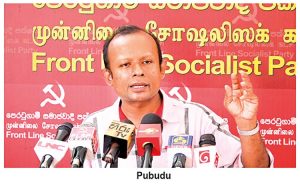Disputed take-over of Colombo Dockyard by Mazagon
The ruling National People’s Power (NPP) and the parliamentary Opposition are under the thumb of India, Frontline Socialist Party (FSP) spokesman, Pubudu Jayagoda, alleged yesterday (01).
Jayagoda cited Mazagon Dock, India’s biggest warship builder, securing a controlling interest in Colombo Dockyard PLC (CDPLC) as a glaring case in point.
The Opposition conveniently turned a blind eye to the Indian move for obvious reasons, Jayagoda said, demanding that the main Opposition Samagi Jana Balawegaya (SJB), Sri Lanka Podujana Peramuna (SLPP), the United National Party (UNP) and Sarvajana Balaya reveal their official position on the issue at hand.
 Jayagoda said that it was not so difficult to comprehend the NPP’s subservient attitude to Narendra Modi’s India but the Opposition’s silence is deafening.
Jayagoda said that it was not so difficult to comprehend the NPP’s subservient attitude to Narendra Modi’s India but the Opposition’s silence is deafening.
Responding to The Island queries, the FSP spokesman emphasised that the whole issue had to be examined, taking into consideration the disputable Japanese role in the developing situation here. Acknowledging that Japan had been one of Sri Lanka’s long-standing development partners and helpful in numerous ways, regardless of political changes here, the outspoken political activist pointed out Tokyo appeared to have backed the Indian takeover of the strategic asset in Colombo.
The Indian Defence Ministry-run Mumbai headquartered Mazagon Dock paid USD 52.96 mn to Japan’s Onomichi Dockyard to secure controlling interests of the CDPLC. “The Parliament should be collectively held responsible for India taking over the Japanese share of the CDPLC. In a geopolitical sense, we are cozying up to the US-led Quad alliance that includes Australia, Japan and India,” Jayagoda said, alleging that the NPP was taking an utterly dangerous path.
Jayagoda pointed out the trade union arm of the JVP, the main party in the NPP, that had been strongly opposed to questionable foreign investments here, should explain its position. If the CDPLC had been in such a precarious situation, financially, why on earth India wanted to take over a loss-making venture, Jayagoda asked, pointing out the strategic importance of the acquisition.
A dissident group of JVPers formed the FSP in April 2012. Asked whether the FSP opposed the JVP-led NPP government out of jealousy, Jayagoda said that the issue here is the government blatantly pursued the policies of the UNP, SLFP-led alliances and the Wickremesinghe-Rajapaksa coalition. Political parties represented in Parliament had treacherously allowed foreign powers to exploit the bankrupt country to their hearts content, Jayagoda alleged, pointing out how the passage of the Economic Transformation Bill, in July 2024, in the run-up to the presidential election, without a vote, gave whoever exercised political authority to do as it pleased.
Jayagoda said that the 2021 agreement that paved the way for India and Japan to jointly develop the West Container Terminal (WCT) was also a key element in the overall strategy. John Keells is in this joint venture with India’s Adani Ports and Special Economic Zone Ltd., (APSEZ) and the Sri Lanka Ports Authority (SLPA), Jayagoda said.
The agreement was reached on the WCT after the government cancelled a tripartite agreement that involved India, Japan and Sri Lanka in the development of the Easter Container Terminal (ECT), Jayagoda said.
The $800 million project, developed under a 35-year Build, Operate, and Transfer (BOT) agreement, commenced operations in early April this year.
Jayagoda said that since 2014 the Modi administration relentlessly sought to expand its influence here. The recent signing of seven MoUs that covered vital sectors, including defence, significantly strengthened India’s hold on its smaller neighbour, Jayagoda said, adding that the Chinese, too, pursued its own strategy at Sri Lanka’s expense.
Jayagoda mentioned that the MoUs signed on 05 April this year hadn’t been tabled in Parliament or subjected to discussion with the parliamentary Opposition.
“The take-over of the Hambantota Port by the Chinese, during the Yahapalana administration, is a case in point,” Jayagoda said, as political parties, represented in Parliament, seemed to have extended their support to foreign interventions by remaining silent. “The entire country knows about the controversy over the Colombo Port City. We are not opposed to foreign investment or joint ventures. The issue is the absence of transparency in foreign investments.”
By Shamindra Ferdinando
